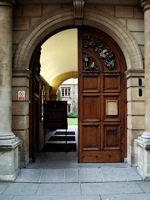Difference between revisions of "Accommodate"
m (Text replacement - "http://" to "https://") |
|||
| Line 3: | Line 3: | ||
==Etymology== | ==Etymology== | ||
[[Latin]] accommodatus, past participle of accommodare, from ad- + commodare to make fit, from commodus suitable | [[Latin]] accommodatus, past participle of accommodare, from ad- + commodare to make fit, from commodus suitable | ||
| − | *Date: [ | + | *Date: [https://www.wikipedia.org/wiki/16th_Century 1550] |
==Definitions== | ==Definitions== | ||
:transitive verb | :transitive verb | ||
| Line 17: | Line 17: | ||
Most commonly, '''accommodation''' (in British usage) or accommodations (in American usage) refers to lodging in a dwelling or similar living quarters afforded to [[travel]]ers in hotels or on cruise ships, or prisoners, etc. | Most commonly, '''accommodation''' (in British usage) or accommodations (in American usage) refers to lodging in a dwelling or similar living quarters afforded to [[travel]]ers in hotels or on cruise ships, or prisoners, etc. | ||
| − | It also refers to the [[process]] by which the vertebrate [ | + | It also refers to the [[process]] by which the vertebrate [https://en.wikipedia.org/wiki/Eye eye] [[changes]] [https://en.wikipedia.org/wiki/Optical_power optical power] to maintain a clear image ([[focus]]) on an object as its distance changes. |
| − | Accommodation acts like a reflex, but can also be [[consciously]] [[control]]led. Mammals, birds and reptiles vary the [ | + | Accommodation acts like a reflex, but can also be [[consciously]] [[control]]led. Mammals, birds and reptiles vary the [https://en.wikipedia.org/wiki/Optical_power optical power] by changing the form of the elastic lens using the [https://en.wikipedia.org/wiki/Ciliary_body ciliary body] (in [[humans]] up to 15 diopters). Fish and amphibians vary the [[power]] by changing the distance between a rigid lens and the retina with muscles. |
| − | It is [[normally]] accompanied by a [[convergence]] of the eyes to keep them directed at the same point, sometimes termed accommodation convergence reflex.[ | + | It is [[normally]] accompanied by a [[convergence]] of the eyes to keep them directed at the same point, sometimes termed accommodation convergence reflex.[https://en.wikipedia.org/wiki/Accommodation_%28eye%29] |
==See also== | ==See also== | ||
*'''''[[Condescension]]''''' | *'''''[[Condescension]]''''' | ||
[[Category: General Reference]] | [[Category: General Reference]] | ||
Latest revision as of 23:32, 12 December 2020
Etymology
Latin accommodatus, past participle of accommodare, from ad- + commodare to make fit, from commodus suitable
- Date: 1550
Definitions
- transitive verb
- 1 : to make fit, suitable, or congruous
- 2 : to bring into agreement or concord : reconcile
- 3 : to provide with something desired, needed, or suited (as a helpful service, a loan, or lodgings)
- 4 a : to make room for
- b : to hold without crowding or inconvenience
- 5 : to give consideration to : allow for <accommodate the special interests of various groups>
- intransitive verb :
- to adapt oneself; also : to undergo visual accommodation
Description
Most commonly, accommodation (in British usage) or accommodations (in American usage) refers to lodging in a dwelling or similar living quarters afforded to travelers in hotels or on cruise ships, or prisoners, etc.
It also refers to the process by which the vertebrate eye changes optical power to maintain a clear image (focus) on an object as its distance changes.
Accommodation acts like a reflex, but can also be consciously controlled. Mammals, birds and reptiles vary the optical power by changing the form of the elastic lens using the ciliary body (in humans up to 15 diopters). Fish and amphibians vary the power by changing the distance between a rigid lens and the retina with muscles.
It is normally accompanied by a convergence of the eyes to keep them directed at the same point, sometimes termed accommodation convergence reflex.[1]
